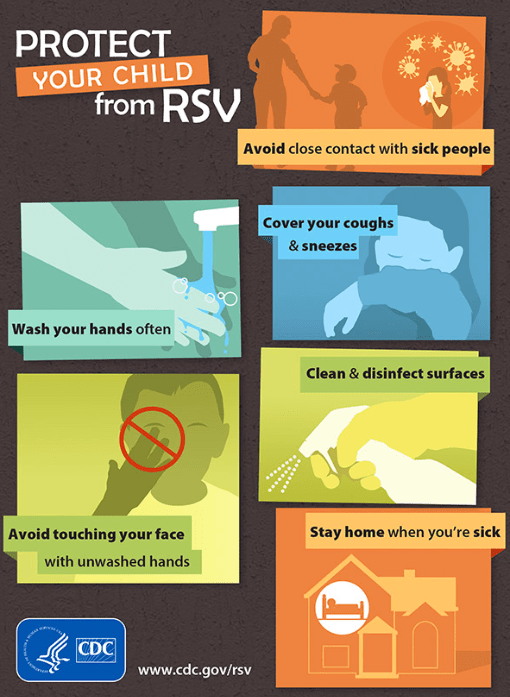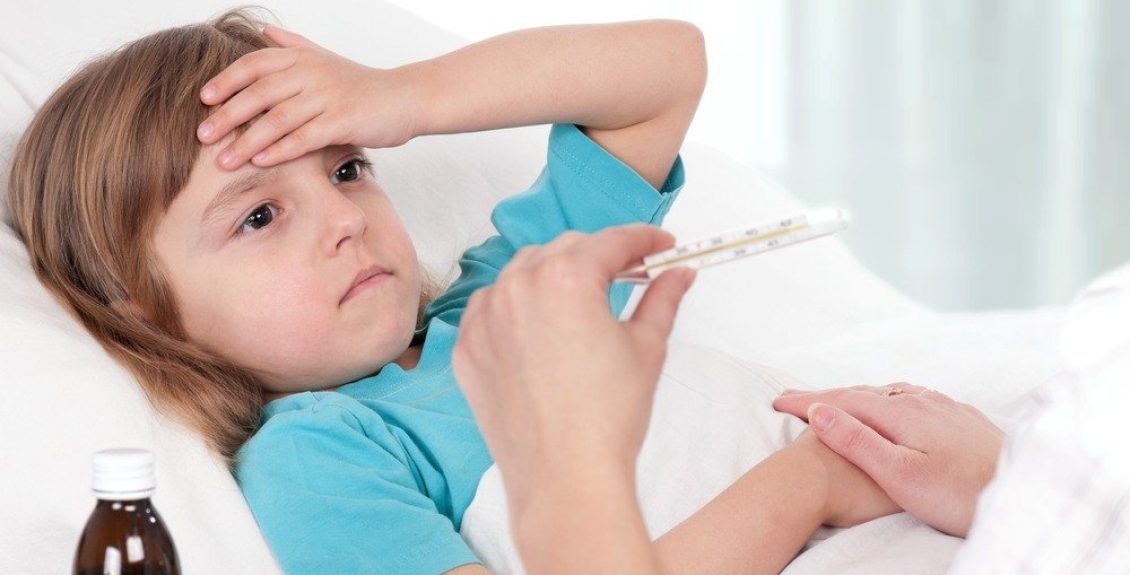Heads up parents … We are nearing the peak of RSV season!! You can help protect your child and those around you with the following easy tips below! And of course, come see us if your child is under the weather.
What Is RSV?
RSV (respiratory syncytial virus) is a common respiratory virus that usually causes mild, cold-like symptoms. For most people, recovery is 7-14 days. But in young children and older adults, it can be a more serious situation. The CDC reports that RSV is the most common cause of bronchiolitis (inflammation of the small airways in the lung) and pneumonia (infection of the lungs) in children younger than 1 year of age in the United States. It is also a significant cause of respiratory illness in older adults.
When Does RSV Hit?
RSV spreads from fall to spring, but from late December to mid-February is peak RSV season. A quick online search for recent articles about RSV and you’ll see things like “Local doctor warns against kissing, touching babies due to RSV”, “Doctors warning about virus that spreads like a cold” and “Health officials remind parents how easily RSV can spread to kids around holidays”.
Symptoms
If you think that your child might be suffering from RSV, look for the following symptoms.
- Runny nose
- Loss of appetite
- Coughing
- Sneezing
- Fever
- Wheezing
These symptoms may not appear all at once and may vary depending on the age of the child. For example, in a young infant, they may be dealing with irritability, decreased activity, and breathing difficulties. Most children will experience an RSV infection by the time they reach their second birthday. The symptoms generally show up 4-6 days after the infection sets in.
Treating RSV
Most of the time an RSV infection will clear up naturally in 7-14 days. Make sure that your child has plenty to drink to prevent dehydration, which is common with RSV. Over-the-counter medications like acetaminophen or ibuprofen can help reduce any fever or pain the child is experiencing. Please contact us with any questions that you have about medications for your child.
RSV will usually run its course at home, but there are cases that lead to a stay in the hospital. A newborn child younger than six months may need to be admitted if they are struggling to breathe or are dehydrated.
How It Spreads
 The RSV virus spreads through someone who is infected coughing or sneezing. Small droplets from those coughs or sneezes can get into another person’s eyes, nose, mouth. Or they can get left on a door handle, counter, or any place that someone might touch. When a child touches that surface and then touches their face without washing their hands, they can get infected. The virus can also spread through direct contact. An example of this might be kissing the face of a sick child.
The RSV virus spreads through someone who is infected coughing or sneezing. Small droplets from those coughs or sneezes can get into another person’s eyes, nose, mouth. Or they can get left on a door handle, counter, or any place that someone might touch. When a child touches that surface and then touches their face without washing their hands, they can get infected. The virus can also spread through direct contact. An example of this might be kissing the face of a sick child.
When your child is infected with RSV, they will be contagious for 3-8 days. However, the infected child may continue to spread the virus for up to 4 weeks. One difficulty with RSV is that the virus can survive for several hours on a hard surface like a child’s crib. On a softer surface like skin, it doesn’t last quite as long. Those at the greatest risk from a severe illness related to RSV are:
- premature infants
- young children with congenital heart or chronic lung disease
- young children with weakened immune systems due to a medical condition or medical treatment
- adults with compromised immune systems
- older adults, especially those with underlying heart or lung disease
RSV Prevention
So what can you do to prevent your child from being infected with RSV? Or, at least reduce the chances of it happening? Anyone in the home that has a cold or similar symptoms needs to make sure to cover their mouth when they cough or sneeze. And don’t just use your hands. Cover those coughs with a tissue or a shirt sleeve. Be sure to wash your hands frequently using soap and water. This should be done for at least 20 seconds. Avoid direct contact like a kiss or handshake and do not share drinks or other objects that may have germs on them. You can also make a difference by keeping surfaces like doorknobs clean.
Anyone who has cold-like symptoms should avoid interacting with children who may be at risk of contracting RSV. One way that parents can do this is to limit the amount of time that your child spends in daycare or other places that can be highly contagious settings.
Just 4 Kids Urgent Care
Your children are going to come into contact with germs. There’s really no way to eliminate that from happening. But, as a parent, you want to protect them as much as you can. Following these tips can help you to keep them healthier and happier. Please give us a call or come and see us if you have any questions or need some peace of mind.
